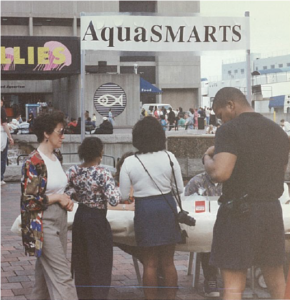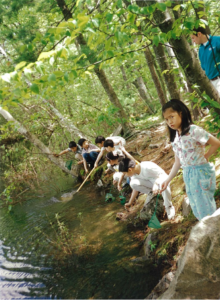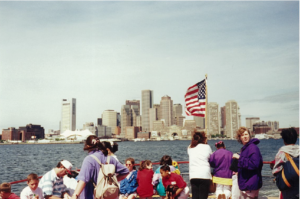In the early nineties, the New England Aquarium, the Massachusetts Water Resource Authority (MWRA), and Boston Partners in Education worked together to create a program that would enrich the scientific knowledge and interest of students in three Boston Public Schools. The program, AquaSmarts, became a three-pronged effort to boost the scientific curriculum in the Boston Public Schools by increasing access to materials, field trips, and hands-on learning experiences.

Students and AquaSmarts volunteers outside the New England Aquarium.
AquaSmarts began at the Harvard-Kent and Donald McKay School for students in grades 3-5. The MWRA used their own curriculum and even donated children’s books about water conservation to classrooms. The MWRA provided volunteers from their workforce who had a background in water science for the program. Volunteers gave students detailed explanations of where their water came from, how it was cleaned, and more general knowledge about the water cycle and their local environment.
Volunteers from the MWRA, supplied with training from Boston Partners and materials donated by the New England Aquarium, would make classroom visits in groups of three. Once there, they led discussions, taught lessons, and assisted the children in lab experiments. Every project was meant to improve the students’ scientific knowledge and observational skills.

Students on an AquaSmarts field trip conducting experiments.
Hands-on experience was a major feature of AquaSmarts. Field trips were organized not only to the New England aquarium, but also to many different parts of the freshwater ecosystem surrounding Boston, including rivers, bogs, and the coast. The program frequently ran labs, and extra effort was taken to make the lessons directly relevant to the students’ immediate surroundings. As a result, this partnership gave students access to a wealth of environmental knowledge and experience that the schools could not offer alone.
AquaSmarts offered two kinds of benefits for schools and students. Principally, it created new opportunities for learning that enriched students and teachers. The program’s final report in 1996 noted, “Through the AquaSmarts program, students gained great enthusiasm for science and an awareness of possible science related careers, most specifically connected to water.” In program-end surveys, teachers reported having a greater understanding and appreciation for science among their pupils that will follow them into their middle school years.

AquaSmart students and volunteers on a field trip cruising the Boston Harbor.
The other benefit, one which Boston Partners has strived to achieve with all of its programs, was building and sustaining relationships with the schools and volunteers. Three volunteers who began serving as AquaSmarts educators continued to visit their schools as classroom assistants for the next two decades (read their story here). On a larger scale, the program allowed the New England Aquarium to develop a relationship with BPS that continues to this day, creating the foundation for further programs run entirely by the Aquarium.
These sustained connections teach us much about the value of collaborative programming, beyond the immediate benefits to students. Boston Partners is proud to have created these links for the past 50 years.
